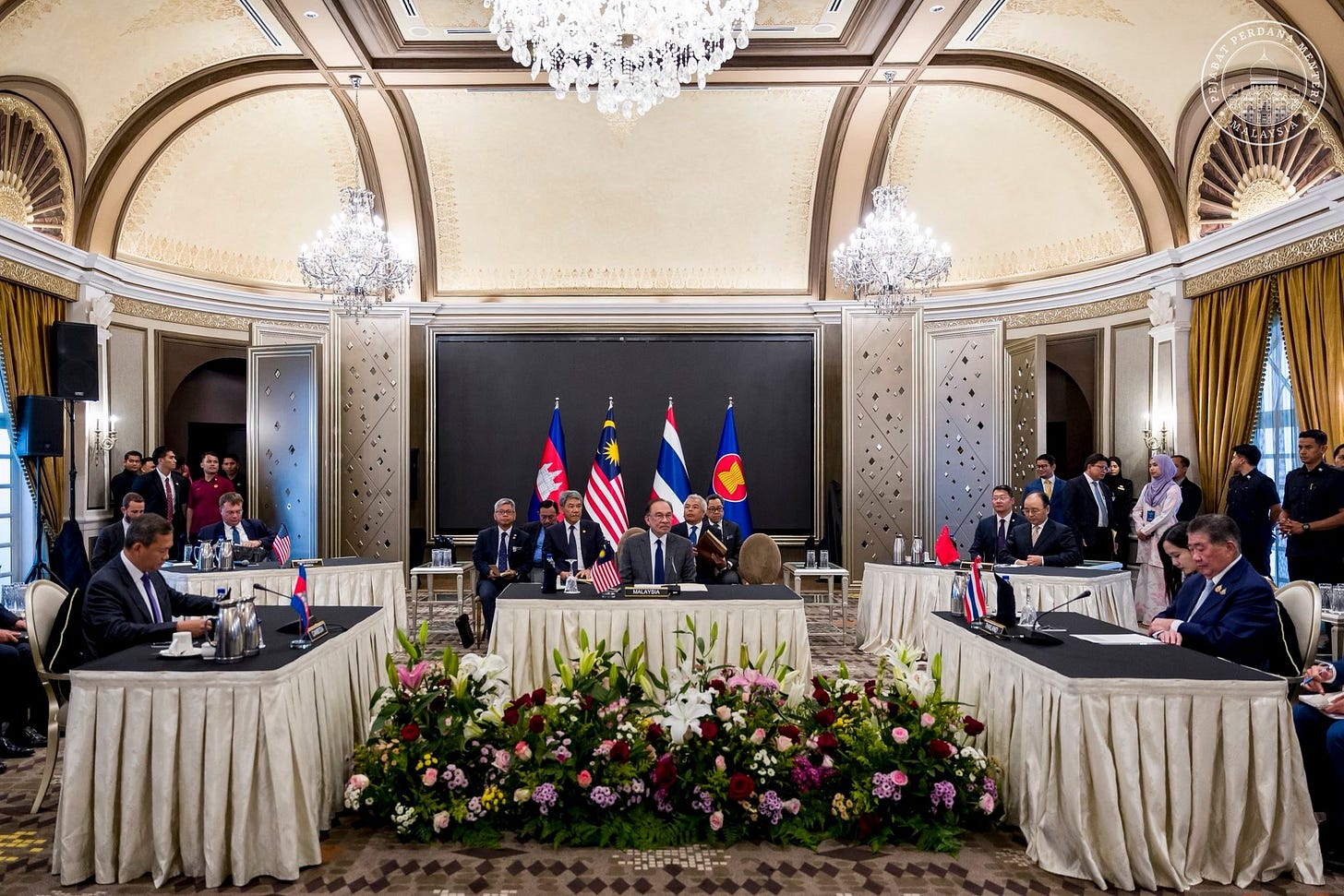Thailand and Cambodia Agrees on Ceasefire
Preliminary thoughts

UPDATE 7/29/25 9:30am — The Royal Thai Army has accused Cambodia of violating the ceasefire. (Source)
Yesterday, when it was announced that Thailand’s Acting Prime Minister Phumtham Wechayachai and Cambodia’s Prime Minister Hun Manet will conduct talks mediated by Malaysian Prime Minister Anwar Ibrahim in Kuala Lumpur, I wrote that the most likely outcome of the negotiations is an agreement to continue negotiations with a ceasefire in the interim. That appears to be exactly what was decided:
Both Cambodia and Thailand reached a common understanding, as follows:
i. an immediate and unconditional ceasefire, with effect from 24:00 hours (local time) on 28 July 2025. This is a vital first step towards de-escalation and the restoration of peace and security;
ii. to convene informal meeting of regional commanders (Regional Military 1 and 2 on the Thai side and Regional Military 4 and 5 of the Cambodian side) at 07:00 hours on 29 July 2025, and followed by meeting with the Defence 1Attaches led by the Chair of ASEAN, if both sides agreed; and
iii. to convene a meeting of the General Border Committee (GBC) on 4 August 2025, to be hosted by Cambodia.
This outcome was expected in part because looming in the distance is the August 1 deadline to finalize a trade deal with President Donald Trump with both Thailand and Cambodia seeking to avoid 36 percent tariff rates with the United States. (Trump had previously said that he would not conclude an agreement with either country if the fighting does not stop). Whether or not a ceasefire will hold is too early to tell.
Indeed, I would not even say that we know conclusively that it will start. With the ceasefire not taking effect until midnight tonight, at the time of writing reports said that fighting was still ongoing between the two sides — indicating some potential that firing does not cease and both sides could accuse each other of violating the ceasefire agreement. Indeed, a page run by the Royal Thai Army made a post saying: “Keep following the situation. Will it be possible? An immediate ceasefire at tonight at midnight, with no conditions.” According to the Thai Enquirer, however, this is not unprecedented: “Similar patterns were observed in previous Thai-Cambodian border clashes, including in 2011 and during the 2008–2010 standoff, when both parties reportedly intensified artillery fire and repositioned troops near key border points just before ceasefires began.”
1. There is no guarantee that this ceasefire will put an end to tensions between Thailand and Cambodia, because we do not know if any of the underlying dynamics have been resolved.
Let’s say, however, that the ceasefire holds. What happens next? We can analyze this conflict on two levels. On substantive matters such as which maps to utilize in territorial demarcation, I discussed yesterday, both sides are still miles apart. One positive for the Thai side was an agreement to return to bilateral negotiations, and there was no mention in the statement of the International Court of Justice, whose jurisdiction the Thai government does not recognize.
But that is only the surface. I wrote two days ago that the current conflict is best explained through the prism of an “international family feud” between the Shinawatras on one hand and Hun Sen on the other (not via the dynamics of Thai domestic politics). We have no idea if any of the underlying issues that led to the collapse of this relationship have been resolved, and if not what that means in terms of the potential for future conflict.
2. The “unconditional” nature of the ceasefire that the Thai government agreed to may not be well-received at home.
The Pheu Thai negotiating team was under pressure to “overperform,” so to speak, because it was operating at an immense domestic trust deficit. I am not sure that the result attained will satisfy its critics at home. Given that the ceasefire was agreed to unconditionally, many Thais on social media have begun asking whether or not this will alleviate Cambodia of any responsibility for its attacks on civilians. The optics of the negotiations have already come under criticism, with a senator asking why Phumtham shook hands with Hun Manet when “he has Thai blood on his hands.”2 I have even seen criticism of allowing Cambodia to host the next GBC meeting. The domestic implications will become clearer in the coming days.
I would keep an eye on the meeting tomorrow morning between the militaries of the two countries. In a sense, I wonder if the government has decided to delegate the details to the Royal Thai Army (we do not know yet exactly what issues will be discussed between them) — in effect giving them a hot potato to manage — but having the army take the lead on this matter may be inevitable given how much distrust there is towards Pheu Thai. As Phumtham said: “The First Army Region and the Second Army Region will have a joint discussion with the Cambodian military. We are currently coordinating these talks. [The government] has given the military the role of final concluder.”
These are just some of my preliminary thoughts on a very fluid situation. More to come in the next days ahead.
Worth noting that there is no consensus in Thailand that the trade talks should be prioritized over settling the border dispute. For example, yesterday Palang Pracharath’s deputy leader Thirachai Phuvanatnaranubala (a former finance minister) said that Thailand should not succumb to external pressure and let the army decide on the best course of action. And so even this deadline may not be enough to keep the ceasefire on track.
I personally think many Thais would have been happier if Phumtham went for the Abe Shinzo / Xi Jinping handshake look.

